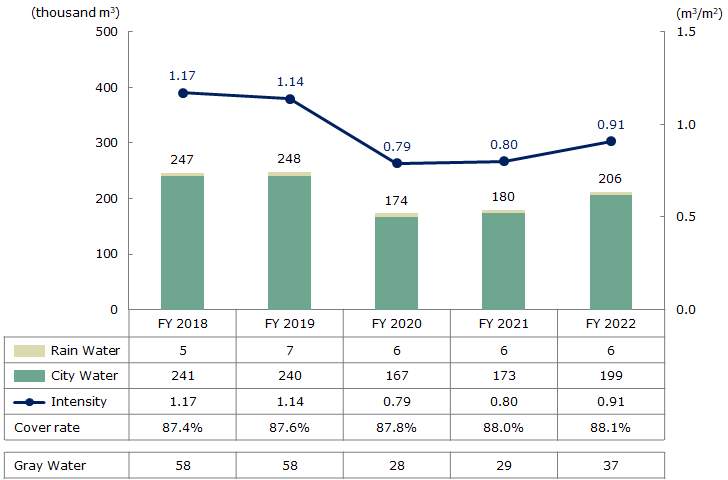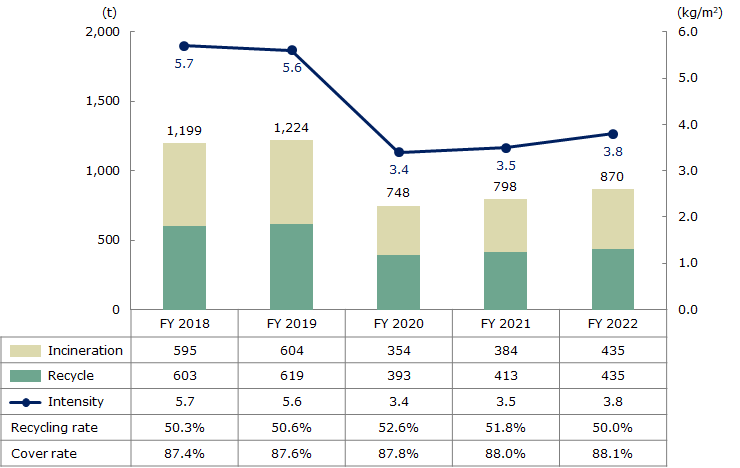Resource Recycling (Water and Waste)
Policy and Approach
Depletion of water and various resources and the environmental impact caused by waste is a problem that is growing in concert with the worldwide population increase and economic development.
Moreover, pollution of soil, water quality and the air caused by chemical substances is becoming an increasing important social issue.
Ignoring these matters will jeopardize the welfare of people as well as social capital, and will lead to the loss of society’s trust in the companies from which the causes originate.
Therefore, we believe that it is the company’s responsibility to take initiative.
MHR and MIM promote the 3R activities (reduce, reuse and recycle) for water resources, waste, materials and such to reduce the burden on the environment.
We aim for the formation of recycling-oriented cities as well as observe environment-related laws and regulations, and thorough measures against pollution.
Effective Use of Water Resources
Objective and Performance of Reduction in Water Use
We are targeting a 10% reduction by FY2030 in water consumption intensity for the total calculated floor area of MHR and MIM’s offices and properties owned by MHR (with FY2013 as the baseline year). The amount of water consumption decreased temporarily from FY2020 to FY2022 due to the decline in the number of workers and visitors as a result of the spread of COVID-19.

* According to “Aqueduct 3.0 Country Rankings” by World Resources Institute (WRI), the Tokyo area, where MHR’s properties
are located, has baseline water stress (BWS) of less than 40% and is not categorized as an area with high water stress.
Adoption of Water-Efficient Equipment
We are working to reduce our water consumption by introducing water-efficient equipment when carrying out upgrading work at office properties owned by MHR. Water-efficient toilets (6 L per flush) were also installed in the washrooms at Toranomon Hills Mori Tower at the time of construction.
Use of Rainwater and Gray water
MHR has promoted effective use of water resources at properties it owns by storing and recycling rainwater collected from buildings throughout the area.
MHR also uses waste water (non-sewage and relatively low contamination) as gray water (non-drinkable for general use) such as flush water for toilets and other applications for effective use of water resources.
- The number of properties using rainwater and graywater: 6 properties
- Properties with use of rainwater and graywater as a percentage of all owned properties: 77% based on acquisition price
Trends of Water Intake Data and Intensity
[Boundary] Offices of MHR and MIM and some properties owned by MHR

|
- *
- Intensity is calculated by dividing the amount of water use by the calculated total floor area.
|
Promotion of Recycling
3R in Managing Office Building
MHR’s properties which are managed by MB aim to significantly increase the recycling rate of all properties managed by MB by promoting the recycle of paper waste at offices as well as the garbage recycling of retail facilities.
Objective and Performance of Promotion of Recycling
We are targeting a recycling rate of at least 75% by FY2030 at MHR and MIM’s offices and properties owned by MHR.

<Example: Improvement of separated collection method>
In order to promote the recycling of paper waste, we are creating awareness among tenants by improving garbage separation and collection methods at offices and creating a “Recycle Hand-Book.”
Transitions of Waste Emission, Intensity and Recycling Rate
[Boundary] Offices of MHR and MIM and some properties owned by MHR

|
- *
- Intensity is calculated by dividing the amount of waste emission by the calculated total floor area.
|
Anti-Pollution Measures
MHR and MIM thoroughly observe environmental laws and regulations concerning environmental pollution and hazardous substances.
In MIM’s “Management Guidelines,” we list the usage and management status of harmful substances such as “chlorofluorocarbons, PCBs, asbestos, etc.” as due diligence items at the time of acquisition of real estate, stipulating the accurate understanding of the existence of these substances and their status of management as well as making this an element to consider in deliberating acquisitions.
In addition, if hazardous substances are found in the properties owned by MHR, appropriate processing and procedures in accordance with laws and regulations shall be maintained and the substances shall be handled strictly so that they are not leaked or released.
Violations of Environmental Laws and Regulations
At MHR and MIM, there have been no cases in which punitive measures have been imposed due to a violation of environmental laws and regulations and no cases in which violations have been raised by conflict resolution mechanisms (as of August 30, 2021).